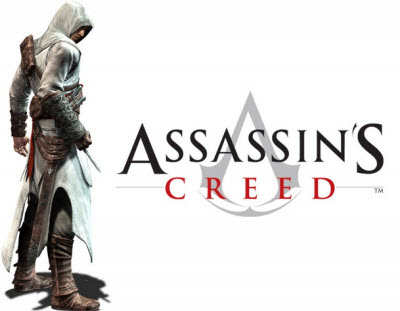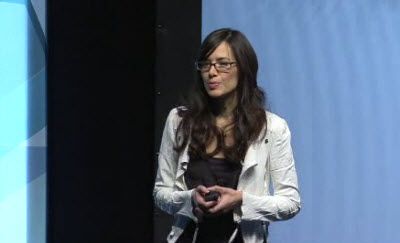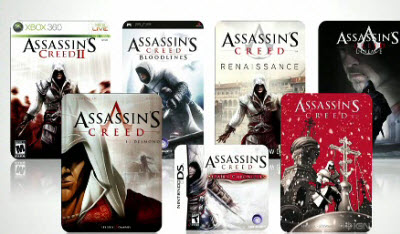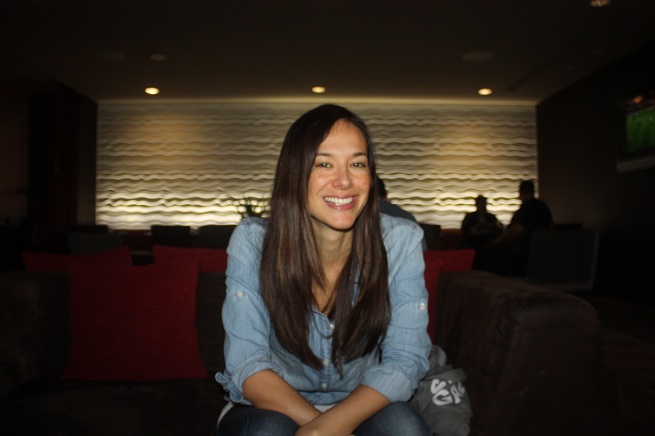Jade Raymond, managing director at Ubisoft Toronto, is one of the video game industry’s highest profile game designers. In 2004, she joined Ubisoft Montreal, where she became the producer of the original Assassin’s Creed title. In July 2009, she became managing director of the Ubisoft Toronto studio. Her team has grown to 300 employees, and it is working on releases like Tom Clancy’s Splinter Cell: Blacklist, Watch Dogs, and another unannounced project. She built the studio from scratch while raising two kids.
 All of those titles are very ambitious, and Raymond isn’t shy about wanting to make “blockbuster” games rather than the hip, new social, mobile, or online offerings. Raymond is one of the developers who clearly loves her trade. She set her heart on joining the game industry at the age of 14. She played as many games as possible and programmed in her spare time. She got a computer-science degree and broke into the trade as a programmer at Sony. She went on to become a producer on The Sims Online at Electronic Arts, and then, she finally got her dream job making Assassin’s Creed, which ended up being the fastest-selling new intellectual property in video games in 20 years.
All of those titles are very ambitious, and Raymond isn’t shy about wanting to make “blockbuster” games rather than the hip, new social, mobile, or online offerings. Raymond is one of the developers who clearly loves her trade. She set her heart on joining the game industry at the age of 14. She played as many games as possible and programmed in her spare time. She got a computer-science degree and broke into the trade as a programmer at Sony. She went on to become a producer on The Sims Online at Electronic Arts, and then, she finally got her dream job making Assassin’s Creed, which ended up being the fastest-selling new intellectual property in video games in 20 years.
“Being a woman in games rocks,” she said in a speech at the DICE Summit in 2011. In that speech, she actually said many of the changes happening in the industry were “depressing,” given the success of lightweight social games. But she has continued to marshal the resources necessary to make huge bets on new intellectual properties in the game business. Ubisoft has given Raymond an enormous amount of resources to invest in AAA blockbuster games at a time when social, mobile, and online games are becoming more prominent. If she fails, the opportunity cost will be gigantic. And if she succeeds, then Ubisoft will be one of the industry survivors with multiple entertainment franchises.
GamesBeat’s Sebastian Haley and I sat down for an interview with Raymond at the Game Developers Conference in San Francisco. Here’s an edited transcript of the conversation.
GamesBeat: As far as the ongoing debate over women in games and women in the industry, what do you think of all that? You landed on the “hottest women in tech” list or whatever it is. It seems like the subject is coming up more intensively this year. How do you feel about the whole issue?
Jade Raymond: In my day-to-day, I don’t really think about it. In my career, I find that working in the games industry has been a great experience for me. I agree that there aren’t as many women as I would like to see, but at the same time, women draw more women. In the teams where I’ve been, there have always been more than the average number of women. By default, women feel more comfortable if there’s a woman producing or whatever.
On Assassin’s Creed, it wasn’t a ton, but I think the Ubisoft average is about 20 percent women, and we had 30 percent on the AC team. You wouldn’t guess that by looking at the game, but that was the case. At EA of course I worked on The Sims, which is a brand with a lot of female followers. At Ubisoft Toronto, half of our management team are women. The tech lead for the studio is a woman. There’s Heather Steele. Heather Hooker, our director of HR. There’s Leslie, who is the head of the IGDA in Toronto and also one of our producers. When you look around the steering team for the studio, it’s half women. Looking at games from the outside, partially in the press and maybe also looking at the number of female characters in games, there’s a lot of work to. Working within the industry, though, I have never had a hard time.
 GamesBeat: It seems to come up over and over again, but do you see signs of progress?
GamesBeat: It seems to come up over and over again, but do you see signs of progress?
Raymond: I hope so. I think so. Games used to be much more niche. It used to be that not so many people played games. My sisters and I grew up playing games, so that’s why I wanted to get into the games industry. It’s only by being exposed to games that you think, “Oh, someone makes games. This is something I want to do.” But now games are much more mass market. There isn’t that niche type of gamer. All kids play games. They’re all on their tablet or their PC or whatever. Because all kids, whether they’re boys or girls, are playing games, a more diverse group of people are thinking they want to get into games. With the graduates that we’re hiring out of school, it’s a much better ratio.
GamesBeat: So what have you been doing lately? Setting up the studio?
Raymond: I was producer on Assassin’s Creed, and then I was executive producer on Assassin’s Creed II. I was also overseeing new IP at the Montreal studio. I was executive producer on the AC brand but also on some of the new IP in development there. Then, I was pregnant with my first daughter. When I was eight months pregnant, Yannis Mallat asked me to move to Toronto and start up the new studio. My husband and I moved there with our daughter when she was five months old. I was hiring some people while I was on maternity leave. Now, the studio has been up and running for three years. We’re about to ship our first big game.
GamesBeat: How many people are there now?
Raymond: It’s a little more than 300.
GamesBeat: How do you manage that?
Raymond: You hire very good, talented people. [Laughs] I like to say that, whenever possible, you should hire people who are better than you. Eventually, if you do a good job, you get to sit in your office and play games all day and make them run the studio.
GamesBeat: Do you feel like running a blockbuster game is much different from running something smaller?
Raymond: Well, Assassin’s Creed didn’t start as a blockbuster. When I was working on the first Assassin’s Creed, we set the bar high and we had it in our mind that we were creating the next big franchise, but when we spoke to the marketing teams, they said, “Why are we going to support that game? We don’t even know how much it’s going to sell. It’s new. Who knows?”
That’s what I like, starting things up. That’s why I was so excited to get a chance to go to start up Assassin’s Creed and then go on to oversee new IP. A couple of those games are about to come out. I was there with the team helping out at the start of Watch Dogs and also another new IP we’re launching. Now, I get the chance to start a new studio. That’s exciting, to be able to work with such a talented team and build something new for Ubisoft.
 GamesBeat: How has Blacklist turned out?
GamesBeat: How has Blacklist turned out?
Raymond: Well, we’re still working on it. We’re in the final stages, but we’re definitely still working on it. We’re playtesting constantly and putting that layer of polish on. I think this is the game where we finally get to fully realize the vision that Max and Alex had. We had a vision with Assassin’s Creed — the promise was there — but we didn’t get to deliver it all until Assassin’s Creed II. It’s similar with Far Cry 2. That team had a great vision for emergent gameplay and stuff like that, but you didn’t get to see it fully executed until Far Cry 3.
I feel like now, with Blacklist, we’re doing that with the full range of the ultimate stealth experience. We’re innovating and pushing the multiplayer and the co-op to what those guys had in mind all along. We saw the beginnings of it with Conviction, in the co-op there. Now we’re creating this seamless experience. We can do all these things in one shot.
GamesBeat: Do you consider Blacklist as a reboot, almost?
Raymond: No, it’s not a reboot. It continues the story where Conviction left off. Sam is continuing his journey. All the details of his life are consistent. He’s just moved into a leadership role, so he’s gone from being the lone wolf to being the boss, the guy with his own team. It’s more exciting, because it allows us to have this experience where Sam is looking at a map — he’s in a plane, he’s mobile, he can go anywhere he wants — and that means, as a player, you can drop into a co-op mission if you want to or you can drop in and continue the story.
GamesBeat: Have you read about this town in Canada called Stafford?
Raymond: Yeah.

GamesBeat: That’s what we think of when we hear about Watch Dogs. The city operating system and all that. IBM always talks about that kind of operating system as well. Is there a real-world connection to this? It’s plausible, but is it reflected in actual examples?
Raymond: A lot of those technologies are being thought up and installed in different places. It’s an extension of what would happen or what could happen or what is happening.
GamesBeat: We did this story on what is happening. A company called LeoNovus is giving away free computers and free Internet access and then allowing another firm to harness the unused computing time and create a distributed data center. They’re basically operating the device in people’s homes to compute things elsewhere. It’s very cool tech.
Raymond: We were talking to a guy last week about his initiative, which is making smart cities. They react better to things. There tends to be less violence in these places, better self-regulation and moderation. There’s a big push in Canadian cities to have these smart communities.
GamesBeat: And then your fiction is pointing out the down side to all of this.
Raymond: With Blacklist, we were inspired by Anonymous. Obviously it depends on your personal views, but when you look at a lot of the Anonymous stuff, what they’re doing is, I think, for good causes. They’ve spoken out about gay marriage and all kinds of other causes that I believe are good ones. But you can also take the next step and ask what would happen if someone did those same things for the wrong reasons, to support a worse cause. There are so many different angles to the way tech is developing. Maybe it’s being used for good, but what if it isn’t in the future?
GamesBeat: Maybe your game will be like a reality TV show.
Raymond: [Laughs] Hopefully not. But people are installing these high-tech surveillance systems in their houses. They have the nanny cam that watches the baby all the time. From work, they can go through the Internet and see what’s happening at home. They can adjust the lights and everything. Imagine now if that system in your home gets hacked and random people are watching your kids. Maybe nothing goes wrong, but it’s still a creepy idea.
 GamesBeat: Now that you’ve worked at several companies and run your own studio, what do you try to do to keep yourself excited and enthusiastic, and your employees as well?
GamesBeat: Now that you’ve worked at several companies and run your own studio, what do you try to do to keep yourself excited and enthusiastic, and your employees as well?
Raymond: That’s a lot of things in one. With games, one thing you have to keep in mind is that it’s not like movies. It’s not one person writing a script and the rest of the team works on it. It’s not the creative director who has the idea. A great idea can be executed terribly and become a terrible game. A so-so idea can become a great game if it’s well-executed, and the people on the team are given the autonomy to add their own special touches and add that magic that surprises the player and keeps things interesting.
You have to find a way to get everyone on the team excited and make it their game. Maybe their task is programming some small feature, but when they’re working on it, they’re not just thinking, “How did the game designer write this feature? I’ll just code it as written.” They’re thinking, “How is the player going to experience this? How do I make it better? What do I think is better? I’m gonna add my own touches. I’m gonna talk to the animator. I’m gonna see if they can help me make this better. We’ll put it together on the side and convince the producer that this is the thing to do.” You need to set up a team where people feel like they can do that because that’s where you get the surprises. That’s where you get the great stuff.
On the first Assassin’s Creed, for example, the free running and the ability to go anywhere in the world came from Richard Dumas and Alex Drouin, the animator and the gameplay programmer. They had been working on Prince of Persia, and they wanted to raise the bar on that kind of interaction with the environment. That was their passion. That’s how you make a great game, by letting everyone on the team have that kind of passion.
That can translate to the studio, too. Not only do you do that on games, but you set up a studio where people can do the same thing with their culture and have input on the way that the studio is run. We set it up so that people can decide what we’re going to build next in the studio. What’s the biggest priority to people? We poll people all the time. What franchises would you be most excited to work on next? What’s interesting to you? What do you want to see us focus on next? We have some money, and we can build a gym or a game room — which one do you want to see most? Everyone has a say.
We’re lucky enough to have people from all over the industry, and I wanted to make sure that we’re not just continuing to do things as Ubisoft does as far as best practices. With so many people coming in from everywhere else, we’re asking them what worked well at their other studios and what didn’t. When you start that dialogue, people get comfortable. Soon enough you don’t have to ask them anymore. They’re just used to coming and telling you. Once, we put up a climbing wall in the hall, and we didn’t ask everyone. It was the designers’ idea. We said, “Fine, that’s inexpensive, and it looks colorful. We’ll put it up there.” People just came to my office and said, “That was a dumb idea. Why did you do that? We’re not going to climb in the middle of the studio!”
We’re creating that kind of atmosphere in the game and in the studio, where people are contributing their best work and incentivized to do so. You don’t always succeed, but at least, when you’re getting things wrong, people feel comfortable enough to tell you.
 GamesBeat: When you did your DICE talk, you let slip that you were depressed about how triple-A games were in decline and how all this weird social stuff was coming up. Do you still feel that way? Have you adapted to some of what’s changing?
GamesBeat: When you did your DICE talk, you let slip that you were depressed about how triple-A games were in decline and how all this weird social stuff was coming up. Do you still feel that way? Have you adapted to some of what’s changing?
Raymond: There are innovative things happening within these social games. There’s stuff we need to learn and incorporate into our games. But I didn’t join the games business to wind up in the gambling business instead. If we’re starting a new IP, I would like the question to be, “What are people looking for out of games? What are the new opportunities with new tech? What can we do that’s different and innovative and surprise people?” I’m less excited if our jobs are, “What are some addictive mechanics that we can fit into this game so we’re monetizing people as quickly as possible?” That’s not as interesting to me as a job.
I like the meaty, immersive experiences. Those are the games I like to play the most. It’s not to say I don’t also love playing Tetris or Bejeweled or whatever when I have a few minutes, but I love the meaty games that you can sink your teeth into. Those are the games that I hope that we get to continue to make.
VentureBeat's mission is to be a digital town square for technical decision-makers to gain knowledge about transformative enterprise technology and transact. Learn More

